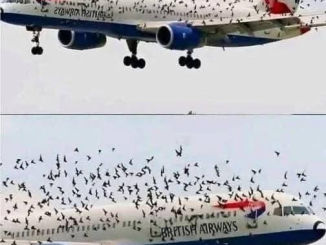
The water had already swallowed most of the neighborhood by the time the rescue boats arrived. I don’t even remember how high it had gotten—it felt like it crept in quietly, like a secret, until suddenly we were trapped on the second floor, waiting.
My son, Kael, had cried himself to sleep in my arms. His tiny fingers still clenched the toy firetruck he refused to let go of. He didn’t understand any of it. I barely did.
Then the soldier came. No name, just a calm voice, soaked boots, and arms that somehow made me feel like I didn’t have to keep holding everything together.
He didn’t ask questions. Just looked at me, nodded, and scooped us up like he did it every day.
The water was colder than I expected. Murky. Full of things I didn’t want to imagine. He kept moving, steady and sure, like it didn’t touch him. Like none of it could shake him.
I wanted to thank him.
But instead, all I could think about—through the chaos, the sirens, the sound of rushing water—was the letter I’d hidden in the lining of Kael’s baby bag. The one with my sister’s name on it. The one that explained everything: why we’d come here, why I couldn’t go back, why no one could know where we were.
He didn’t know he wasn’t just saving us from the flood.
He was saving us from something else entirely.
And just as he reached the boat, he leaned close and quietly asked, “You sure no one else is waiting for you?”
I hesitated.
Then Kael stirred.
And behind us, on the flooded overpass, I saw him.
He was standing ankle-deep in water on what little was left of the road. His jeans soaked, his face red from shouting. I could hear his voice now, rising over the storm.
“Lena! Lena, come back!”
I turned my face away, clutched Kael tighter. My heart started thudding so hard I thought the soldier might feel it through his jacket. He looked at me again, waiting.
“No,” I said. “There’s no one else.”
The soldier didn’t look back. He just gave the softest nod, like he knew not to ask, and carried us the last few steps into the boat. The motor roared to life, and the water pulled us away from the wreckage of the street, from the man who had once sworn he loved me more than life itself.
But love wasn’t supposed to leave bruises. It wasn’t supposed to make you lie awake wondering what kind of man your child would grow into if he kept hearing those screams.
Kael shifted in my lap, still asleep. The soldier handed me a blanket, even though we were already soaked through. He didn’t say much—just stayed at the front of the boat, scanning the rising water like it might whisper secrets if he listened close enough.
I wanted to speak, to tell him thank you, to say something that would make me feel like less of a coward.
But all I could do was watch the ruined streets pass by and wonder if this flood was the only thing strong enough to carry us away from the life I’d almost let swallow us whole.
The shelter they brought us to was a gymnasium two towns over. It smelled like bleach, wet socks, and tired hope. Families huddled on cots, volunteers handed out soup, and everything buzzed with quiet, desperate energy.
Kael finally woke up, hungry and groggy, and the first thing he asked was, “Where’s Daddy?”
I froze.
I told him we were safe now, and that was all that mattered. He didn’t ask again, just played quietly with his toy firetruck on the floor beside our cot.
The soldier came by once to check if we needed anything. I asked his name then.
“Callum,” he said, and gave a small smile before walking off to help an older couple with their bags.
I tucked that name away like a keepsake.
The next morning, I asked if there was any way to get to the post office. One of the volunteers raised an eyebrow. I lied, said I needed to let my sister know we were okay.
The truth was, the letter had been written weeks before. Sealed with shaking hands and hidden in the only place he’d never look—inside the baby bag, under the lining.
It told Clara everything. About the fights. The threats. The last time, when Kael had been in the room and I saw the flicker of something in his eyes—fear, maybe. Or worse, understanding.
Clara had begged me to leave. I hadn’t. Not then.
But the flood gave me a way out that didn’t make me feel weak. It was nature’s hand reaching down and pulling me free. How could he blame me for that?
Two days later, Callum found me sitting outside the shelter, watching Kael chase bubbles another volunteer had brought.
“You okay?” he asked, sitting beside me on the concrete step.
I nodded. “I will be.”
He was quiet for a moment, then said, “You were running from more than water, weren’t you?”
I didn’t answer.
But I think he knew.
Some people see too much to ask for explanations.
It took weeks to sort everything out. The flood had damaged not just homes, but records, databases, paper trails. It was the kind of chaos that made it easier to disappear, if you wanted to.
With Clara’s help, I did.
She met us at a diner two hours away from the shelter. Kael ran into her arms like he’d known her his whole life.
We stayed with her in the country while I rebuilt. I got a job cleaning cabins at a nearby lodge. Kael started preschool. He stopped asking about his dad.
And me? I slept through the night for the first time in years.
One Saturday in late November, Kael was down with a fever, and I was flipping through the local paper someone had left on the porch. There, in the bottom corner, was a story about the flood recovery teams.
A photo caught my eye—soldiers lined up near a boat, the water high and brown behind them.
There was Callum.
I cut out the picture.
Never told anyone why I kept it in the back of my journal.
Three months passed. Then one morning, Clara handed me the phone, a strange look on her face.
“It’s for you,” she said. “Says his name’s Callum.”
I almost dropped the mug in my hand.
He didn’t ask how I was, not right away. Just said he was nearby, working with a recovery crew helping rebuild roads, and he thought he might stop by.
He never said how he found me. I didn’t ask.
Somehow, I wasn’t afraid.
He came the next day. Parked his dusty truck beside Clara’s tulips and stepped out with that same calmness in his shoulders.
Kael remembered him instantly. Ran up to show him his now-battered firetruck.
They spent the afternoon building a fort in the yard while I watched from the kitchen window.
When Kael went down for a nap, Callum joined me on the porch.
“You didn’t owe me an explanation,” he said. “But I knew something was chasing you.”
I swallowed. “It still is. He’s not the type to just let go.”
He looked out at the trees, thoughtful. “If he ever shows up, he’ll have more than water to get through.”
I believed him.
And for the first time, I didn’t feel alone.
Spring came fast that year. With it, a new kind of hope.
Callum stayed longer each time he visited. Kael started calling him “Cal,” and I caught myself laughing more often, without realizing.
Then, one day, as we were planting tomatoes in the yard, I told him everything.
No more half-truths. I gave him the whole story—start to finish.
He didn’t flinch. Just wiped the dirt from his hands, took mine, and said, “You don’t have to run anymore.”
That night, after Kael was asleep, I pulled out the old letter. The one I’d never sent.
I read it again. And for the first time, I didn’t cry.
Instead, I burned it.
Not because the story didn’t matter—but because it no longer defined me.
Six months later, I stood in a courthouse with my hand on Kael’s shoulder, and a lawyer on either side.
I watched as the judge signed the final order.
Full custody. No visitation.
Turns out, when someone disappears during a federal evacuation and never checks on their kid, it’s hard to argue they’re fit to parent.
Especially when another man—quiet, steady, and good—has stepped in without being asked.
Callum never proposed with a ring.
One day, he just said, “This feels like home,” and I nodded.
That was enough.
Later, we had something small in Clara’s backyard. Kael wore a bowtie and spilled juice on Callum’s boots. We laughed until we cried.
I don’t tell many people how we met.
Not because I’m ashamed.
But because some stories are better kept close—tucked behind the heart, like a letter in a baby bag.
If you’d asked me back then what I was running from, I would’ve said a man.
Now, I know I was running toward something. Toward safety. Toward a second chance.
And somehow, through a storm and a flood and a hundred small mercies, I found it.
Funny how life works that way.
Sometimes the hardest storms lead you exactly where you were always meant to be.
If you’ve ever felt stuck or afraid to leave something that no longer serves you, I hope this story reminds you: even floods can be a kind of grace.
And sometimes, the strangers who carry us through the worst… end up walking with us into something beautiful.





Leave a Reply